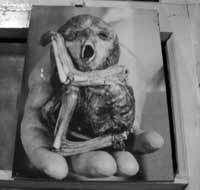Poor ecology may turn Russia into vast Chernobyl mutant
The poor ecology in the city of Ekaterinburg affects not only humans, but other inhabitants too. Scientists have noticed significant mutations happening with animals and birds nesting in industrial areas of the capital of Russia’s Ural.

Vladimir Bogdanov, a deputy director of the Institute of Ecology of the Russian Academy of Sciences, said that mutation, like natural selection, is a common process. Biologists can observe millions of mutations every year – slight changes in chromosomes. However, scientists also face many incidents of harmful mutations under bad ecological conditions, which may often lead to lethal outcomes for the creatures bearing damaged genes. It may also become the source of serious hereditary diseases among both animals and humans.
Vladimir Bogdanov believes that the harmful mutations occur due to changes in the natural background. Heavy metals and radiation evince a very harmful influence on those inhabiting polluted areas.
“A house mouse in Ekaterinburg suffers chromosome changes which occur with animals inhabiting the Chernobyl zone,” the scientist said.
The specialist said that the city was polluted at a much greater extent in the 1970s and the 1980s.
Ekaterinburg (formerly Sverdlovsk) is a major city in the central part of Russia. Situated on the eastern side of the Ural mountain range, it is the main industrial and cultural center of the Urals Federal District. Its population of 1,293,537 (2002 Census), which is down from 1,364,621 recorded in the 1989 Census, makes it Russia's fifth largest city. Between 1924 and 1991, the city was known as Sverdlovsk, after the Bolshevik leader Yakov Sverdlov.
Mutations are changes to the nucleotide sequence of the genetic material of an organism. Mutations can be caused by copying errors in the genetic material during cell division, by exposure to ultraviolet or ionizing radiation, chemical mutagens, or viruses, or can occur deliberately under cellular control during processes such as hypermutation. In multicellular organisms, mutations can be subdivided into germ line mutations, which can be passed on to descendants, and somatic mutations, which are not transmitted to descendants in animals. Plants sometimes can transmit somatic mutations to their descendants asexually or sexually (in cases where flower buds develop in somatically mutated parts of plants). A new mutation that was not inherited from either parent is called a de novo mutation. The source of the mutation is unrelated to the consequence, although the consequences are related to which cells are affected.
Mutations create variation within the gene pool. Less favorable (or deleterious) mutations can be reduced in frequency in the gene pool by natural selection, while more favorable (beneficial or advantageous) mutations may accumulate and result in adaptive evolutionary changes. For example, a butterfly may produce offspring with new mutations. The majority of these mutations will have no effect; but one might change the color of one of the butterfly's offspring, making it harder (or easier) for predators to see. If this color change is advantageous, the chance of this butterfly surviving and producing its own offspring are a little better, and over time the number of butterflies with this mutation may form a larger percentage of the population.
Neutral mutations are defined as mutations whose effects do not influence the fitness of an individual. These can accumulate over time due to genetic drift. It is believed that the overwhelming majority of mutations have no significant effect on an organism's fitness. Also, DNA repair mechanisms are able to mend most changes before they become permanent mutations, and many organisms have mechanisms for eliminating otherwise permanently mutated somatic cells.
Mutation is generally accepted by the scientific community as the mechanism upon which natural selection acts, providing the advantageous new traits that survive and multiply in offspring or disadvantageous traits that die out with weaker organisms.
Subscribe to Pravda.Ru Telegram channel, Facebook, RSS!





